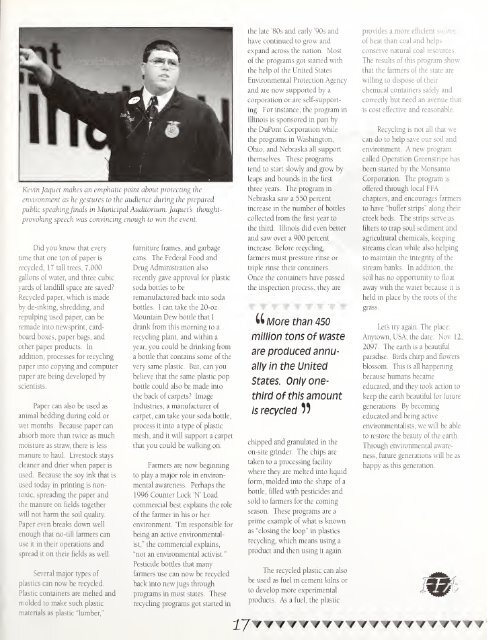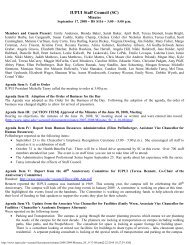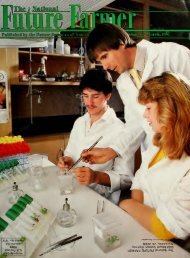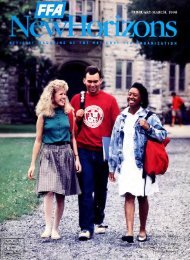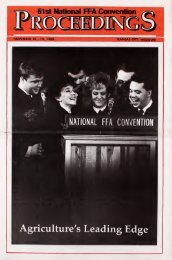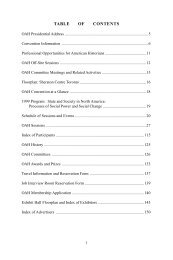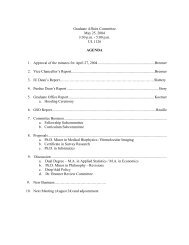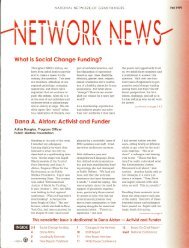Proceedings, 1997
Proceedings, 1997
Proceedings, 1997
Create successful ePaper yourself
Turn your PDF publications into a flip-book with our unique Google optimized e-Paper software.
Kevin Jaquet makes an emphatic point about protecting the<br />
environment as he gestures to the audience during the prepared<br />
public speaking finals in Municipal Auditorium. Jaquet's thought-<br />
provoking speech was convincing enough to win the event.<br />
Did you know that every<br />
time that one ton of paper is<br />
recycled, 17 tall trees, 7,000<br />
gallons of water, and three cubic<br />
yards of landfill space are saved?<br />
Recycled paper, which is made<br />
by de-inking, shredding, and<br />
repulping used paper, can be<br />
remade into newsprint, card-<br />
board boxes, paper bags, and<br />
other paper products. In<br />
addition, processes for recycling<br />
paper into copying and computer<br />
paper are being developed by<br />
scientists.<br />
Paper can also be used as<br />
animal bedding during cold or<br />
wet months. Because paper can<br />
absorb more than twice as much<br />
moisture as straw, there is less<br />
manure to haul. Livestock stays<br />
cleaner and drier when paper is<br />
used. Because the soy ink that is<br />
used today in printing is non-<br />
toxic, spreading the paper and<br />
the manure on fields together<br />
will not harm the soil quality.<br />
Paper even breaks down well<br />
enough that no-till farmers can<br />
use it in their operations and<br />
spread it on their fields as well.<br />
Several major types of<br />
plastics can now be recycled.<br />
Plastic containers are melted and<br />
n olded to make such plastic<br />
materials as plastic lumber,"<br />
furniture frames, and garbage<br />
cans. The Federal Food and<br />
Drug Administration also<br />
recently gave approval for plastic<br />
soda bottles to be<br />
remanufactured back into soda<br />
bottles. 1 can take the 20-oz.<br />
Mountain Dew bottle that I<br />
drank from this morning to a<br />
recycling plant, and within a<br />
year, you could be drinking from<br />
a bottle that contains some of the<br />
very same plastic. But, can you<br />
believe that the same plastic pop<br />
bottle could also be made into<br />
the back of carpets 7 Image<br />
Industries, a manufacturer of<br />
carpet, can take your soda bottle,<br />
process it into a type of plastic<br />
mesh, and it will support a carpet<br />
that you could be walking on.<br />
Farmers are now beginning<br />
to play a major role in environ-<br />
mental awareness. Perhaps the<br />
1996 Counter Lock TSP Load<br />
commercial best explains the role<br />
of the farmer in his or her<br />
environment. "I'm responsible for<br />
being an active environmental-<br />
ist," the commercial explains,<br />
"not an environmental activist."<br />
Pesticide bottles that many<br />
farmers use can now be recycled<br />
back into new jugs through<br />
programs in most states. These<br />
recycling programs got started in<br />
IT<br />
the late '80s and early '90s and<br />
have continued to grow and<br />
expand across the nation. Most<br />
of the programs got started with<br />
the help of the United States<br />
Environmental Protection Agency<br />
and are now supported by a<br />
corporation or are self-support-<br />
ing. For instance, the program in<br />
Illinois is sponsored in part by<br />
the DuPont Corporation while<br />
the programs in Washington,<br />
Ohio, and Nebraska all support<br />
themselves. These programs<br />
tend to start slowly and grow by<br />
leaps and bounds in the first<br />
three years. The program in<br />
Nebraska saw a 550 percent<br />
increase in the number of bottles<br />
collected from the first year to<br />
the third. Illinois did even better<br />
and saw over a 900 percent<br />
increase. Before recycling,<br />
farmers must pressure rinse or<br />
triple rinse their containers.<br />
Once the containers have passed<br />
the inspection process, they are<br />
M More than 450<br />
million tons of waste<br />
are produced annu-<br />
ally in the united<br />
States. Only one-<br />
third of this amount<br />
is recycled W<br />
chipped and granulated in the<br />
on-site grinder. The chips are<br />
taken to a processing facility<br />
where they are melted into liquid<br />
form, molded into the shape of a<br />
bottle, filled with pesticides and<br />
sold to farmers for the coming<br />
season. These programs are a<br />
prime example of what is known<br />
as "closing the loop" in plastics<br />
recycling, which means using a<br />
product and then using it again.<br />
The recycled plastic can also<br />
be used as fuel in cement kilns or<br />
to develop more experimental<br />
products. As a fuel, the plastic<br />
provides a more efficient source<br />
of heat than coal and helps<br />
conserve natural coal resources.<br />
The results of this program show<br />
that the farmers of the state are<br />
willing to dispose of their<br />
chemical containers safely and<br />
correctly but need an avenue that<br />
is cost effective and reasonable.<br />
Recycling is not all that we<br />
can do to help save our soil and<br />
environment. A new program<br />
called Operation Greenstripe has<br />
been started by the Monsanto<br />
Corporation. The program is<br />
offered through local FFA<br />
chapters, and encourages farmers<br />
to have "buffer strips" along their<br />
creek beds. The strips serve as<br />
filters to trap soul sediment and<br />
agricultural chemicals, keeping<br />
streams clean while also helping<br />
to maintain the integrity of the<br />
stream banks. In addition, the<br />
soil has no opportunity to float<br />
away with the water because it is<br />
held in place by the roots of the<br />
grass.<br />
Lets try again. The place:<br />
Anytown, USA; the date: Nov. 12,<br />
2097. The earth is a beautiful<br />
paradise. Birds chirp and flowers<br />
blossom. This is all happening<br />
because humans became<br />
educated, and they took action to<br />
keep the earth beautiful for future<br />
generations. By becoming<br />
educated and being active<br />
environmentalists, we will be able<br />
to restore the beauty of the earth.<br />
Through environmental aware-<br />
ness, future generations will be as<br />
happy as this generation.<br />
01


